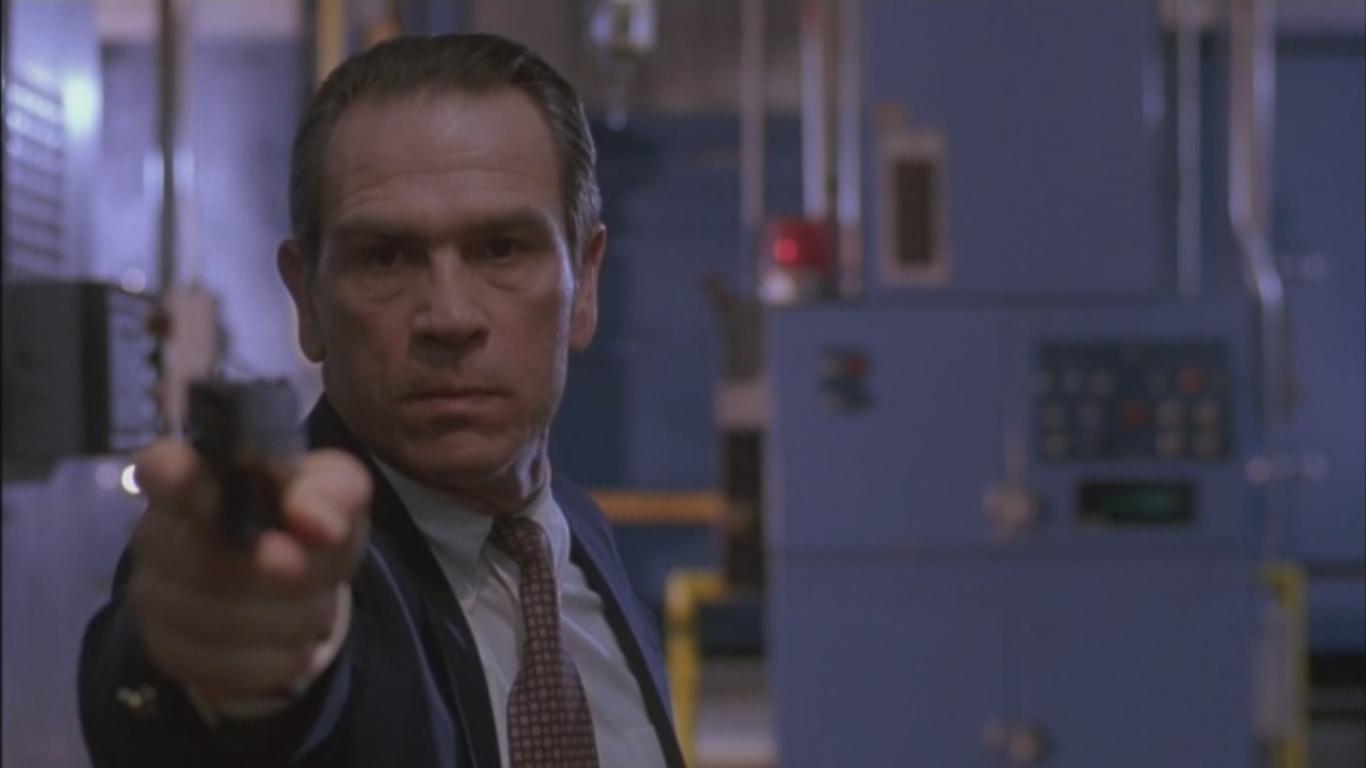Generic [SPOILER ALERT] for a decades old TV show and a 25 year old movie.
The Fugitive is partly to blame for the current era of classic story reimagination. The movie took a 120 hours of television series, which was probably bloated, and condensed it into just over 120 minutes of a tense, relentless action film. And an Oscar winning one at that. Thanks Harrison Ford and Tommy Lee Jones. I’m holding you responsible for the current reboot era.
Dr. Richard Kimble (Harrison Ford) is one of the best doctors working today….that is, until his wife Helen (Sela Ward) is murdered. With insufficient proof of a murderer and probable cause, Kimble is convicted of murder and jailed. As he is being transferred to death row, the other bus prisoners attempt an escape, causing the bus to crash and Kimble to escape. The US Marshals, led by Samuel Gerard (Tommy Lee Jones), take over the search for Kimble. Gerard is determined to deliver his man back to justice, but Kimble is desperate to avenge the loss of his wife and prove his innocence.
What makes the Fugitive stand the test of time is how smart and grounded every character acts, and how most actions in the film can be justified (after the conviction, which is dated due to lack of DNA evidence). Things start simple, with Kimble’s escape looking like the escape of a normal man: his landing isn’t particularly graceful, but it gets the job done. Gerard comes in, and smartly establishes a perimeter knowing a killer is probably on the loose if there’s no body. In response, Kimball removes obvious identifying parts of himself, but Gerard has countered with an adept surveillance of the area and good deductive logic. This game of smart cat and mouse escalates to amazing action sequence climaxes each time, with a showdown between Jones and Ford: the dam, the Cook County jail, and finally, the hotel finale. Why are these sequences so effective? Staging and direction certainly helps, but for me, it’s because of how much I had grown to care about Richard Kimble and his quest for truth, as well as Samuel Gerard and his quest for justice. Because you’re rooting for both sides of The Fugitive’s equation, it makes the stakes even more compelling, pinning you to your seat equally rooting for another smart move by the less powerful character to gain the upper hand.
The Fugitive gets us to invest in both Kimble and Gerard in different ways. The approach to Richard Kimble is Hitchcock’s innocent man wrongly convicted maneuver. By casting Harrison Ford as Richard Kimble, we as audience members are instantly sympathetic to the guy; after all, he’d been playing the everyman hero for at least a couple decades by then. When Kimble’s so certain of his innocence, we already question the evidence against him. When Kimble goes on the run, screenwriters David Twohy and Jeb Stuart have Kimble do little heroic acts along the way, showing how Kimble’s mission isn’t reckless, but calculated and empathetic: he isn’t out for revenge, just to make sure his wife isn’t forgotten and the criminals are brought to justice, a noble goal befitting the noble Ford, who fits the role like a comfortable old pair of running shoes. For Sam Gerard, Director Andrew Davis, having worked with Tommy Lee Jones, let the Jones’s unabashed charisma loose. Jones makes Gerard a hardass law man, proving over and over again why he perfectly is leading any investigation, as well as his group of Marshals who clearly love him. That charisma is infectious, so even though we hate Gerard for hunting our guy, we understand and respect him for it. As the movie goes on, Jones remains a law enforcer, but softens because of the proof Richard Kimble gives him, as well as the respect Kimble earns. Jones was so good in The Fugitive that he won an Oscar for it, beating Ralph Fiennes legendary performance in Schindler’s List. I personally give Fiennes the edge, but not by much, a testament to how much Jones dominates The Fugitive.
Quick shout out to the non-leads in the film too, who lend hands to the leading men and story. Andreas Katsulas is menacing as the mysterious Sykes, injecting some fear and villainy into the 3rd act void. Jeroen Krabbé is fine enough as Kimble’s friend and fellow doctor Charles Nichols, every part Kimble’s equal in intellect. Joe Patoliano, Daniel Roebuck, L. Scott Caldwell, and Tom Wood fill out Jones’s US Marshal Team, providing some day-to-day levity to a movie that needs tension breakers after the intense highs that keep the movie breezing along in the valleys. Joseph Kosala and Ron Dean are perfectly cast to be Chicago Cops, and give The Fugitive its sense of place. And finally, thanks Fugitive, for starting/launching the careers of Neil Flynn, Jane Lynch, and Julianne Moore, key contributors to some great cinema or TV of the last 20 years.
The Fugitive is a perfect prototype of how to properly update and modernize old material for a new generation. The movie condensed hours of material into a base story true to said source, built the movie around 2 stellar leads, filled in the supporting cast with up an comers and people who fit the setting of your movie, and create 3 stellar action sequences that people will be talking about for days after the movie. The only movie to even come close to replicating this formula is 21 Jump Street, and no offense to Jonah Hill and Channing Tatum, but Harrison Ford and Tommy Lee Jones got ya beat!

